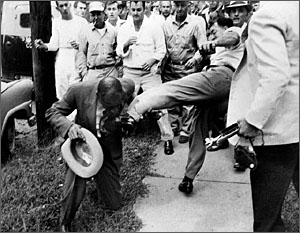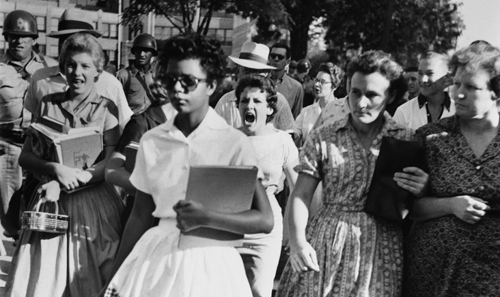Cities and Suburbs
Just writing down a few thoughts, nothing rigorous. The question is, do shifts in the urban/suburban living pattern explain some of the drop in violent crime over the last few decades?
Here is what I am thinking. At one point in time economic forces made city land desirable, and the richest people lived in the city. Outside the city the population density dropped off sharply and people were basically poor or middle class. Then with the advent of the railroad, electricity, the telephone, and the car, a lot of economic activity shifted to the suburbs and to smaller cities, and a lot of rich people moved to the suburbs (where land was cheap, taxes were low, the poor could be excluded, etc.). So the pattern of living shifted from rich and working-class cities (with rural poverty) to rich and working-class suburbs (with urban poverty alongside, in some cases, a core of affluent people still living the in the city).
At this point cities didn't have much to do in economic terms. (They were still centers of government, courts, education, etc., but there were no longer plentiful working-class jobs.) This would, in my story, coincide with the urban crises of the 1970s through 90s. Poor people were located in the cities and were stranded there without good jobs.
But then cities started to gain from their comparative advantage in providing goods and services for consumption. Young people wanted to live in dense areas with lots of social opportunities, good food, good shopping, good transit, a vibrant art scene, etc. Gentrification represents a shift of rich people from the suburbs to the cities and a shift of poor people from cities to inner-ring suburbs. By itself, that just involves moving from one place to another and doesn't necessarily have much impact on poverty or economic opportunity. But it could be that for a given concentration of poverty, cities are more prone to crime than suburbs. (Not 100% sure why that would be, but maybe because in the suburbs you can maintain more physical separation between yourself and your community - not an unambiguously good thing, but maybe good for crime-prevention.)
So in other words, on top of the usual explanations (new policing tactics, lead abatement), maybe crime is falling because gentrification is reorganizing our patterns of living in a way that suppresses crime.
I'm not sure how to test this hypothesis. If it is true, it probably bears on the debates over gentrification, but it also has different implications for different cities. Major cities like Los Angeles, Chicago, and New York probably benefit, but smaller cities, or cities with more entrenched crime and poverty, may not be able to shift the equilibrium. However, it may be that as New York becomes unaffordable, the growing affluent class will spill over into cities like Philadelphia and Baltimore, because the amenities they provide are increasingly scarce (or rather, the supply of dense, attractive urban areas will grow very slowly). Cities will "fill in" with affluent people and other cities will enjoy the same equilibrium shift that New York has undergone.
Alternatively, maybe the amenities people really care about (socializing, good food) will become more available in the suburbs as immigrants are priced out of cities and as the internet enables social interactions even in less dense areas. (Already you see people like Tyler Cowen claiming that the best ethnic food in the DC area is in suburban strip malls.)
Anyway just getting my thoughts down, don't know if I will try to find data (not sure what data to look for), but fun to think about.
Here is what I am thinking. At one point in time economic forces made city land desirable, and the richest people lived in the city. Outside the city the population density dropped off sharply and people were basically poor or middle class. Then with the advent of the railroad, electricity, the telephone, and the car, a lot of economic activity shifted to the suburbs and to smaller cities, and a lot of rich people moved to the suburbs (where land was cheap, taxes were low, the poor could be excluded, etc.). So the pattern of living shifted from rich and working-class cities (with rural poverty) to rich and working-class suburbs (with urban poverty alongside, in some cases, a core of affluent people still living the in the city).
At this point cities didn't have much to do in economic terms. (They were still centers of government, courts, education, etc., but there were no longer plentiful working-class jobs.) This would, in my story, coincide with the urban crises of the 1970s through 90s. Poor people were located in the cities and were stranded there without good jobs.
But then cities started to gain from their comparative advantage in providing goods and services for consumption. Young people wanted to live in dense areas with lots of social opportunities, good food, good shopping, good transit, a vibrant art scene, etc. Gentrification represents a shift of rich people from the suburbs to the cities and a shift of poor people from cities to inner-ring suburbs. By itself, that just involves moving from one place to another and doesn't necessarily have much impact on poverty or economic opportunity. But it could be that for a given concentration of poverty, cities are more prone to crime than suburbs. (Not 100% sure why that would be, but maybe because in the suburbs you can maintain more physical separation between yourself and your community - not an unambiguously good thing, but maybe good for crime-prevention.)
So in other words, on top of the usual explanations (new policing tactics, lead abatement), maybe crime is falling because gentrification is reorganizing our patterns of living in a way that suppresses crime.
I'm not sure how to test this hypothesis. If it is true, it probably bears on the debates over gentrification, but it also has different implications for different cities. Major cities like Los Angeles, Chicago, and New York probably benefit, but smaller cities, or cities with more entrenched crime and poverty, may not be able to shift the equilibrium. However, it may be that as New York becomes unaffordable, the growing affluent class will spill over into cities like Philadelphia and Baltimore, because the amenities they provide are increasingly scarce (or rather, the supply of dense, attractive urban areas will grow very slowly). Cities will "fill in" with affluent people and other cities will enjoy the same equilibrium shift that New York has undergone.
Alternatively, maybe the amenities people really care about (socializing, good food) will become more available in the suburbs as immigrants are priced out of cities and as the internet enables social interactions even in less dense areas. (Already you see people like Tyler Cowen claiming that the best ethnic food in the DC area is in suburban strip malls.)
Anyway just getting my thoughts down, don't know if I will try to find data (not sure what data to look for), but fun to think about.


